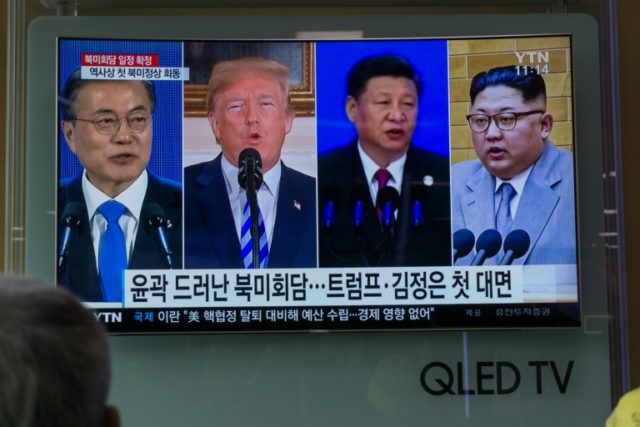North Korean media warned citizens this week to cherish their “independence” and “self-reliance” instead of seeking prosperity through trade with “imperialist” nations a few days after President Donald Trump promised North Korea would become “very rich” if it strikes a good denuclearization deal with the United States.
“All countries and nations should cultivate and bolster their own strength and resolve everything with recourse to it in order to achieve independent development and prosperity,” lectured Rodong Sinmun, newspaper of North Korea’s ruling Worker’s Party, in a Monday editorial.
“Dependence on others is a very dangerous virus which makes a nation mean and weak and lets a country go to ruin. Now that the imperialists are getting more desperate in their moves to dominate other countries and nations and the world, if one tries to get benefit from outsiders while depending on them, instead of depending on his strength, it is as foolish an act as ruining oneself,” the editorial warned.
Rodong Sinmun called on North Koreans to keep faith with their ideology of self-reliant isolationism even as “imperialist and hegemonic forces” apply “harsh pressure” against the North Korean economy. Precisely how the imperialists are able to apply so much pressure against a completely independent and self-reliant communist nation is not explained.
North Korea’s official ideology, devised by the regime’s founding father Kim Il-sung, is called “Juche.” The term literally means “self-reliance,” but that does not imply any sort of individual independence for the people. On the contrary, Juche tells the people to see themselves as mindless hard-working cells in a single huge body, with the current Kim family dictator serving as the brain.
“Independence” in Juche ideology refers to North Korea’s independence from other nations, as the Rodong Sinmun editorial states. More specifically, Kim Il-sung was eager to establish the independence of his communist nation from the Soviet Union.
There is an oblique reference to this precept in another Rodong Sinmun editorial praising self-reliance as the “tradition of Juche Korea’s struggle,” as the author salutes North Korea for being the only authentic communist nation left standing after the “collapse of the world socialist system.”
This editorial assures North Korea’s terrorized, impoverished, starving population they are the envy of the world for their tenacious belief in Kim Il-sung’s doctrine:
The history of the victorious Korean revolution clearly proves that there are neither difficulties insurmountable nor fortresses unconquerable if one has the spirit of self-reliance. Self-reliance is, indeed, the tradition of Juche Korea’s struggle and the dynamics for its victorious advance.
It is the fixed will and faith of the Korean people to build a prospering powerful socialist nation by dint of self-reliance and thus bring into reality the idea of independence and happiness.
Note how these editorials refer to the “Korean people” rather than North Korea or DPRK, the communist regime’s preferred name for itself. Under Juche ideology, the tyrant of Pyongyang is the spiritual leader of all Koreans and the rightful ruler of the entire peninsula. The South Korean government is regarded as illegitimate and a temporary obstacle to the destiny of the Kim dynasty.
There could be some messages to China encoded in these editorial broadsides – in particular, a refusal to adopt China’s fusion of communism with mercantilist market economics, as Beijing wishes. China has been urging North Korea to continue market reforms for decades, in part because it fears the North Korean system will eventually collapse, flood China with refugees, and possibly lead to a unified Korean peninsula under a democratic government.
The simple explanation for these editorial celebrations of “self-reliant” isolationism and hardship is the Kim regime bracing the people to accept the potential collapse of denuclearization talks and long years of suffering under tight international sanctions. The regime may also fear what will happen if negotiations succeed and Trump’s promises come to pass, leaving North Korea with a larger middle class, increased reliance on trade, and more exposure to information from the outside world.

COMMENTS
Please let us know if you're having issues with commenting.